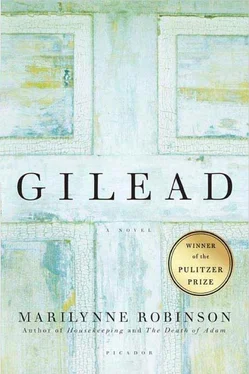I was thinking about that henhouse. It stood just across the yard, where the Muellers’ house is now. Boughton and I used to sit on the roof of it and look out over the neighbors’ gardens and the fields. We used to take sandwiches and eat our dinner up there. I had stilts that Edward had made for himself years before. They were so high I had to stand on the porch railing to get onto them. Boughton (he was Bobby then) got his father to make him a pair, and we pretty well lived on those things for several summers. We had to stay on the paths or where the ground was firm, but we got to be very much at ease on them, and we’d just saunter all over the place, as if it were quite a natural thing. We could sit right down on the branch of a tree. Sometimes wasps were a problem, or mosquitoes. We took a few spills, but mainly it was very nice. Giants in the earth we were, mighty men of valor. We would never have thought that coop could fold up the way it did. The roof was covered in raggedy black tar paper, and it was always warm even when the day was chilly, and sometimes we’d lie back on it to get out of the wind, just lie there and talk. I remember Boughton was already worrying about his vocation. He was afraid it wouldn’t come to him, and then he’d have to find another kind of life, and he couldn’t really think of one. We’d go through the possibilities we were aware of. There weren’t many.
Boughton was slow getting his growth. Then, after a short childhood, he was taller than me for about forty years. Now he’s so bent over I don’t know how you’d calculate his height. He says his spine has turned into knuckle bones. He says he’s been reduced to a heap of joints, and not one of them works. You’d never know what he once was, looking at him now. He was always wonderful at stealing bases, from grade school right through seminary.
I reminded him the other day how he’d said to me, lying there on that roof watching the clouds, “What do you think you would do if you saw an angel? I’ll tell you what, I’m scared I’d take off running!”
Old Boughton laughed at that and said, “Well, I still might want to.” And then he said, “Pretty soon I’ll know.”
***
I’ve always been taller than most, larger than most. It runs in my family. When I was a boy, people took me to be older than I was and often expected more of me — more common sense, usually — than I could come up with at the time. I got pretty good at pretending I understood more than I did, a skill which has served me through life. I say this because I want you to realize that I am not by any means a saint. My life does not compare with my grandfather’s. I get much more respect than I deserve. This seems harmless enough in most cases. People want to respect the pastor and I’m not going to interfere with that. But I’ve developed a great reputation for wisdom by ordering more books than I ever had time to read, and reading more books, by far, than I learned anything useful from, except, of course, that some very tedious gentlemen have written books. This is not a new insight, but the truth of it is something you have to experience to fully grasp.
Thank God for them all, of course, and for that strange interval, which was most of my life, when I read out of loneliness, and when bad company was much better than no company. You can love a bad book for its haplessness or pomposity or gall, if you have that starveling appetite for things human, which I devoutly hope you never will have. “The full soul loatheth an honeycomb; but to the hungry soul every bitter thing is sweet.” There are pleasures to be found where you would never look for them. That’s a bit of fatherly wisdom, but it’s also the Lord’s truth, and a thing I know from my own long experience.
Often enough when someone saw the light burning in my study long into the night, it only meant I had fallen asleep in my chair. My reputation is largely the creature of the kindly imaginings of my flock, whom I chose not to disillusion, in part because the truth had the kind of pathos in it that would bring on sympathy in its least bearable forms. Well, my life was known to them all, every significant aspect of it, and they were tactful. I’ve spent a good share of my life comforting the afflicted, but I could never endure the thought that anyone should try to comfort me, except old Boughton, who always knew better than to talk much. He was such an excellent friend to me in those days, such a help to me. I do wish you could have some idea of what a fine man he was in his prime. His sermons were remarkable, but he never wrote them out. He didn’t even keep his notes. So that is all gone. I remember a phrase here and there. I think every day about going through those old sermons of mine to see if there are one or two I might want you to read sometime, but there are so many, and I’m afraid, first of all, that most of them might seem foolish or dull to me. It might be best to burn them, but that would upset your mother, who thinks a great deal more of them than I do — for their sheer mass, I suppose, since she hasn’t read them. You will probably remember that the stairs to the attic are a sort of ladder, and that it is terribly hot up there when it is not terribly cold.
It would be worth my life to try to get those big boxes down on my own. It’s humiliating to have written as much as Augustine, and then to have to find a way to dispose of it. There is not a word in any of those sermons I didn’t mean when I wrote it. If I had the time, I could read my way through fifty years of my innermost life. What a terrible thought. If I don’t burn them someone else will sometime, and that’s another humiliation. This habit of writing is so deep in me, as you will know well enough if this endless letter is in your hands, if it has not been lost or burned also.
I suppose it’s natural to think about those old boxes of sermons upstairs. They are a record of my life, after all, a sort of foretaste of the Last Judgment, really, so how can I not be curious? Here I was a pastor of souls, hundreds and hundreds of them over all those years, and I hope I was speaking to them, not only to myself, as it seems to me sometimes when I look back. I still wake up at night, thinking, That’s what I should have said! or That’s what he meant! remembering conversations I had with people years ago, some of them long gone from the world, past any thought of my putting things right with them. And then I do wonder where my attention was. If that is even the question.
***
One sermon is not up there, one I actually burned the night before I had meant to preach it. People don’t talk much now about the Spanish influenza, but that was a terrible thing, and it struck just at the time of the Great War, just when we were getting involved in it. It killed the soldiers by the thousands, healthy men in the prime of life, and then it spread into the rest of the population. It was like a war, it really was. One funeral after another, right here in Iowa. We lost so many of the young people. And we got off pretty lightly. People came to church wearing masks, if they came at all. They’d sit as far from each other as they could. There was talk that the Germans had caused it with some sort of secret weapon, and I think people wanted to believe that, because it saved them from reflecting on what other meaning it might have.
The parents of these young soldiers would come to me and ask me how the Lord could allow such a thing. I felt like asking them what the Lord would have to do to tell us He didn’t allow something. But instead I would comfort them by saying we would never know what their young men had been spared.
Most of them took me to mean they were spared the trenches and the mustard gas, but what I really meant was that they were spared the act of killing. It was just like a biblical plague, just exactly. I thought of Sennacherib.
Читать дальше












